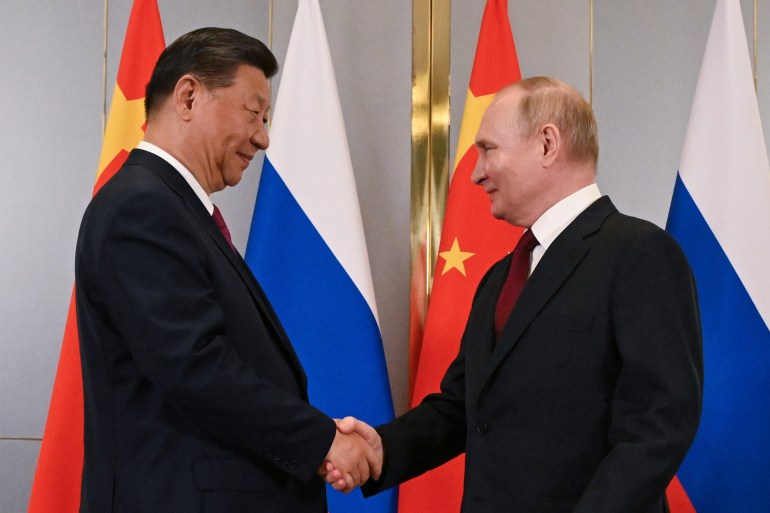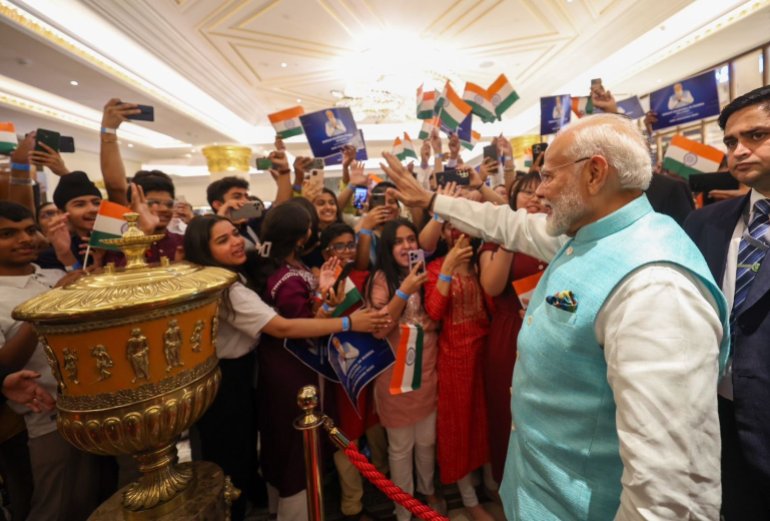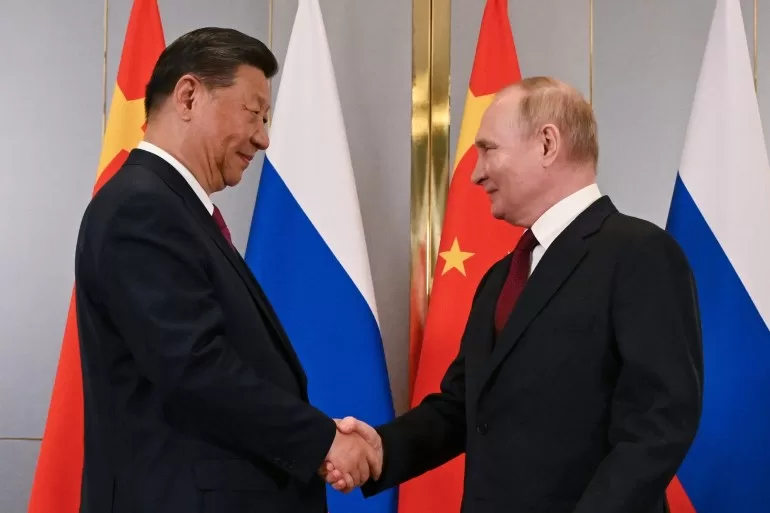India’s Prime Minister Narendra Modi has arrived in Moscow for a two-day visit, his first since Russia sent troops into Ukraine – an action that has complicated the relationship between the longtime partners and pushed Russia closer to India’s rival, China.
Modi was set to have dinner with Russian President Vladimir Putin on Monday, followed by talks at the Kremlin on Tuesday.
“I look forward to reviewing all aspects of bilateral cooperation with my friend President Vladimir Putin and sharing perspectives on various regional and global issues,” said Modi in a statement.
“We seek to play a supportive role for a peaceful and stable region.”
Landed in Moscow. Looking forward to further deepening the Special and Privileged Strategic Partnership between our nations, especially in futuristic areas of cooperation. Stronger ties between our nations will greatly benefit our people. pic.twitter.com/oUE1aC00EN
— Narendra Modi (@narendramodi) July 8, 2024
Modi last travelled to Russia in 2019, when he attended a forum in the far eastern port of Vladivostok and met with Putin. The leaders also saw each other in September 2022 at the Shanghai Cooperation Organisation summit, held in Uzbekistan.
Moscow remains a key supplier of cut-price oil and weapons to India, especially following sanctions on Russia imposed by the United States and its allies that came in response to the Russia-Ukraine war and that shut most Western markets off to Russian exports. According to analysts, India now gets more than 40 percent of its oil imports from Russia.
But the Kremlin’s isolation from the West and blooming friendship with Beijing have impacted Moscow’s time-honoured partnership with New Delhi.
Western powers have in recent years also cultivated ties with India as a bulwark against China and its growing influence in the Asia-Pacific, while pressuring it to distance itself from Russia.
The China factor
Modi last visited Russia in 2019 and hosted Putin in New Delhi two years later, weeks before Russia began its offensive against Ukraine in February 2022. However, the partnership between Moscow and New Delhi has become fraught as Russia has moved closer to China.

A confrontation in June 2020 along the disputed China-India border dramatically altered their already touchy relationship as rival troops fought with rocks, clubs and fists. At least 20 Indian soldiers and four Chinese soldiers were killed. Tensions have persisted despite talks.
Modi notably missed last week’s summit in Kazakhstan of the Shanghai Cooperation Organisation, a security grouping founded by Moscow and Beijing.
‘Defence a priority’
Modi is expected to seek to continue close relations with Russia, which is also a major defence supplier for India.
With Moscow’s arms industries mostly serving the Russian military’s needs amid the fighting in Ukraine, India has been diversifying its defence procurements, buying more from the US, Israel, France and Italy.
“Defence cooperation will clearly be a priority area,” Chietigj Bajpaee, senior South Asia research fellow at Chatham House, told the Associated Press news agency, adding that 60 percent of India’s military equipment and systems are “still of Russian origin”.
“We have seen some delay in the deliveries of spare parts … following the Russian invasion of Ukraine,” he said. “I believe both countries are due to conclude a military logistics agreement, which would pave the way for more defence exchanges.”

India’s neutral stance on the war in Ukraine has bolstered Putin’s efforts to counter what he calls the West’s domination of global affairs.
Following an arrest warrant issued in 2023 by the International Criminal Court for his actions in Ukraine, Putin’s foreign travel has been sparse in recent years, so, analysts say, Modi’s trip could help the Russian leader boost his clout.
“We kind of see Putin going on a nostalgia trip – you know, he was in Vietnam, he was in North Korea,” Theresa Fallon, an analyst at the Centre for Russia, Europe, Asia Studies, told AP.
“In my view, he’s trying to demonstrate that he’s not a vassal to China, that he has options, that Russia is still a great power.”
Trade development will also figure strongly in the talks, particularly the intention to develop a maritime corridor between India’s major port of Chennai and Vladivostok, the gateway to Russia’s Far East.
Indian Foreign Secretary Vinay Mohan Kwatra told reporters on Friday that due to strong energy cooperation, India-Russia trade has increased to nearly $65bn in the 2023-24 financial year, $60bn of it being the imports from Russia. He said India was trying to correct the trade imbalance by increasing its exports.
India’s top exports to Russia include drugs and pharmaceutical products, telecom instruments, iron and steel, marine products and machinery. Its top imports from Russia include crude oil and petroleum products, coal and coke, pearls, precious and semiprecious stones, fertiliser, vegetable oil, gold and silver.
From Russia, Modi will travel to Vienna for the first visit to the Austrian capital by an Indian leader since Indira Gandhi in 1983.
